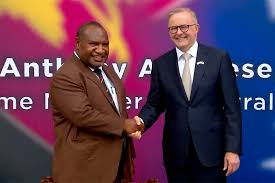Melbourne: Australia and Papua New Guinea’s defence forces will be integrated under a new security pact that will be signed this week, Australian Prime Minister Anthony Albanese said Monday, as his government attempts to curb China’s security influence in the region.
Albanese said he and his Papua New Guinean counterpart, James Marape, will sign the pact Wednesday, a day after celebrating the South Pacific island nation’s 50th anniversary of independence from Australia.
US Deputy Secretary of State Christopher Landau will also be in the Papua New Guinea capital, Port Moresby, for the celebrations.
“It is a very significant upgrade in our defence relationship,” Albanese told Australian Broadcasting Corp. in Perth in Western Australia state before flying to Australia’s nearest neighbour.
“It provides for mutual defence, which means that we will provide support for each other, provide for an integration of our interoperability of our assets and our respective defence forces,” Albanese added.
With an estimated population of almost 12 million people, Papua New Guinea is the most populous nation in the South Pacific after Australia. Australia has 27 million people.
The deal will allow the nations’ citizens to serve in either military. Australia would offer Australian citizenship as an incentive for Papua New Guineans to enlist in the Australian military.
Australia currently only accept recruits from its Five Eyes intelligence-sharing partners, including the United States, Britain, Canada and New Zealand.
Three Pacific island nations have changed their allegiances from Taiwan to Beijing since 2019 as China’s influence in the region has grown. The US and its allies are particularly concerned by China’s growing sway in security through police training in Fiji, Kiribati, Samoa, Solomon Islands and Vanuatu.
Australia and Papua New Guinea signed a security agreement in 2023 that broadened the two nations’ defence cooperation and strengthened Australia’s place as the preferred security partner in a region.
The signing was delayed by six months after a separate security deal struck between the United States and Marape’s government sparked protests in Papua New Guinea in May 2023 over concerns that the US pact undermined national sovereignty.
Oliver Nobetau, project director of the Australia–Papua New Guinea Network at the Sydney-based Lowy Institute international policy think tank, said any wording around “exclusivity” of the partnership in the new Australia-Papua New Guinea pact would be significant.
Several Pacific island nations avoid taking sides in the growing strategic competition between US allies and China.
“If there’s any wording around Australia being the security partner of choice for a country like Papua New Guinea, that would be a big win” for Australia, Nobetau said.
“We know that Pacific countries, PNG in particular, have been quite adamant about protecting their sovereignty, which means removing the sort of language that excludes third-party partnerships,” he added.
Albanese had hoped to sign a security and economic treaty with Vanuatu last week. But concerns within that island nation’s government about how the deal could impact its ability to secure infrastructure funding from China has extended negotiations.
Australian Defence Minister Richard Marles said the new bilateral treaty would replace an agreement struck in 1977 with a newly independent Papua New Guinea.
“This is a transformational agreement between ourselves and PNG,” Marles said.
Australia would continue to discuss with Fiji and Tonga advancing bilateral defence cooperation, Marles said.
AP
